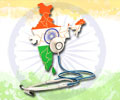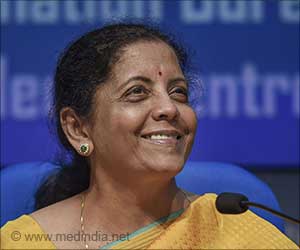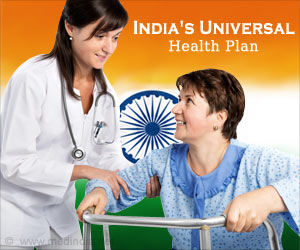NHM is a flagship program launched by the Government of India to provide accessible, affordable, and quality healthcare to rural and urban populations.
- National Health Mission (NHM) is dedicated to providing accessible, affordable, and quality healthcare
- It is a flagship program launched by the Government of India offering a range of initiatives and services
- It aims to improve health indicators and ensure equitable healthcare access for all citizens
Availability of Healthcare Facilities in Rural Area
Go to source). This funding is utilized for various government schemes to promote healthcare inclusion for larger populations (2✔ ✔Trusted Source
Union Budget 2023-2024
Go to source).
National Health Mission (NHM) is a flagship program launched by the Government of India in 2013. The program aims to provide accessible, affordable, and quality healthcare to all citizens.
What is the National Health Mission (NHM)
With the intention of focusing on both rural and urban populations, this mission merged two earlier malnutrition initiatives that were already in place.NHM has four main components
- National Rural Health Mission
- National Urban Health Mission
- Tertiary Care Programmes
- Human Resources for Health and Medical Education
What are the Objectives of NHM
- To reduce the total fertility rate (TFR) to 2.1
- To reduce the Infant Mortality Rate (IMR) to 25 per 1000 live births
- To reduce the Maternal Mortality Rate (MMR) to 1 per 1000 live births
- To reduce the prevalence of malaria to under 1 case per 1000 people
- Women between the ages of 15 and 49 should be protected from and treated for anemia
- To reduce by half the number of cases and deaths from TB
Major Health Programmes Under National Health Mission (NHM)
NHM has provided a range of free services related to maternal health, child health, adolescent health, family planning, universal immunization programme, and for major diseases such as Tuberculosis, vector borne diseases like Malaria, Dengue and Kala Azar, Leprosy etc (3✔ ✔Trusted SourceHealth Programmes under National Health Mission
Go to source).
Other major initiatives are:
Janani Shishu Suraksha Karyakaram (JSSK)
JSSK ensures free and cashless healthcare services for pregnant women and newborns, removing financial barriers and promoting safe deliveries and neonatal careRashtriya Bal Swasthya Karyakram (RBSK)
RBSK offers comprehensive health screening, early detection, and intervention for children, aiding in timely management of developmental and health-related concernsFree Drugs and Free Diagnostics Service Initiatives
These initiatives provide essential medications and diagnostic tests at no cost, alleviating financial burden and improving access to necessary healthcare servicesMobile Medical Units (MMUs)
MMUs bring healthcare to underserved areas, offering medical consultations, diagnostics, and primary care services to remote communitiesTele-consultation Services
Tele-consultation facilitates remote medical advice and diagnosis, enabling patients to connect with healthcare professionals for guidance and treatmentAmbulance Services
Ambulance networks ensure prompt and efficient medical transportation, particularly crucial for emergencies and maternal care in remote regionsPM National Dialysis Programme
This program extends subsidized dialysis services to individuals with kidney disorders, enhancing their quality of life by making essential treatment more accessibleNational Quality Assurance Framework
Implemented nationwide, this framework enhances the quality of healthcare services by ensuring standardized protocols and practices across public health facilities, including those in Maharashtra and all other states/UTs
Contributions of NHM in Promoting the Nation’s Health
The National Health Mission (NHM) programme has contributed significantly to improving healthcare in India through various initiatives.Enhancement of Health Indicators
Over the course of 15 years of implementation, the National Health Mission (NHM) has played a pivotal role in attaining the health-related Sustainable Development Goals (SDGs).
Notably, the NHM has brought about significant advancements in health indicators pertaining to maternal, neonatal, and child health. In India, the rate of decline in these indicators has exceeded global averages, and this progress has been especially accelerated during the NHM's implementation phase.
Expansion of Public Health Infrastructure
The NHM adopts a comprehensive health system approach aimed at establishing a network of public health facilities.
This includes the establishment of Health & Wellness Centres (HWC) at the grassroots level and District Hospitals. These provide comprehensive primary and secondary healthcare services to the populace.
Promotion of Equitable Development
A persistent focus has been maintained on improving healthcare access for marginalized populations, including tribal communities. Particularly for those residing in areas affected by Left Wing Extremism, and the urban poor.
Aspirational District initiative recent endeavor to ensure equitable access and utilization. This initiative identifies 115 districts spanning 28 states with weak social and human development indicators. These districts receive additional resources and capacity-building support to bridge the gap and catch up with more progressive districts.
National Ambulance Services
Presently, the NRHM operates a fleet of 20,990 Emergency Response Service Vehicles. Additionally, 5,499 patient transport vehicles are deployed, specifically catering to "free pickup and drop back" services for pregnant women and sick infants.
Augmentation of Human Resources
The NHM extends support to states in recruiting doctors, nurses, and health workers.
It also oversees the world's largest community health volunteer program through the Accredited Social Health Activists (ASHAs). With more than 10 lakh ASHAs and ASHA facilitators engaged under the NHM, the program has been instrumental in expanding healthcare coverage.
The NHM has also aided states in acquiring professionals with expertise in public health, finance, planning, and management. This enables clinical staff to focus on delivering healthcare services.
Reforms in the Health Sector
The NHM has facilitated the conceptualization and execution of reforms targeting governance, procurement, and technology enhancements within the healthcare sector.
Mitigating High Out-of-Pocket Expenditure (OOPE)
The necessity to reduce the prevailing high levels of out-of-pocket expenditure for pharmaceuticals and diagnostics was acknowledged. The NHM has introduced initiatives like Free Drugs and Free Diagnostics Services.
Additionally, the National List of Essential Medicines (NLEM) and Essential Diagnostics Lists have been officially defined and are periodically updated to encompass more vital drugs based on new initiatives taken.
References:
- Availability of Healthcare Facilities in Rural Area - (https://pib.gov.in/PressReleseDetailm.aspx?PRID=1737180)
- Union Budget 2023-2024 - (https://www.india.gov.in/spotlight/union-budget-2023-2024)
- Health Programmes under National Health Mission - (https://pib.gov.in/PressReleaseIframePage.aspx?PRID=1780140)
Source-Medindia













